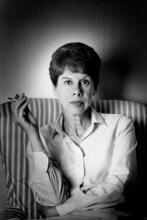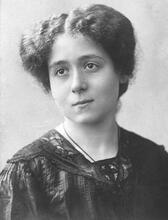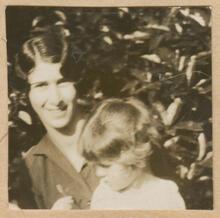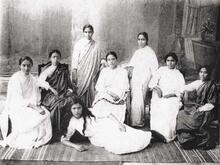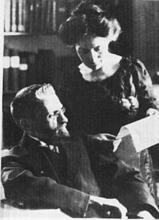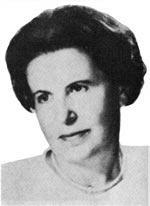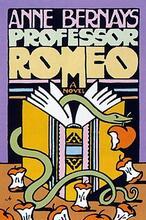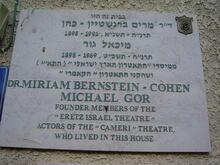Ronit Matalon
Ronit Matalon was the recipient of many of the most prestigious Israeli literary prizes and is considered a giant of Hebrew literature, but like many women and Mizrahi writers, she began her life and work on the margins. The first member of her family born in Israel, Matalon was raised in a former transit camp for Mizrahi immigrants and frequently wrote characters with similar backgrounds. She explored some of the most central and salient conflicts of Israeli life: between Palestinians and Israelis, Arabs and Jews, Mizrahim and Ashkenazim, through the lens of family history and domestic life.
Life and Writing
The Hebrew writer Ronit Matalon was born on May 25, 1959, in Ganei Tikva, Israel, to Egyptian-Jewish immigrants. The poor, immigrant neighborhood where she was born and raised, a suburb of Petach Tikvah, had been established as a ma’abara, or transition camp, created to house Lit. "Eastern." Jew from Arab or Muslim country.Mizrahi immigrants to Israel in the 1950s. Matalon was the only one of her siblings born in Israel, and both French and Arabic were spoken in the home. Her father, a political and social activist, was largely absent from the family and deeply in debt. Matalon’s mother worked as a cleaning woman to support her three children and her own mother, who cared for Ronit. Her parents divorced when she was eight.
Like many children of Mizrahi immigrants, Matalon was assigned to a vocational school as a teenager, where she was to be trained as a laboratory assistant, but her mother helped her enroll in another school that would allow her to study academic subjects. She was the first person in her family who attended university. Matalon studied literature and philosophy at Tel Aviv University. She began writing short stories at age nineteen, while she was a student, publishing her first story before she graduated. Initially she hoped to be a scholar, but when she began writing at university, she was drawn more to writing fiction in the form of short stories. Growing up, Matalon was ashamed that French and Arabic were spoken in her house, and has said of her own linguistic and literary development, “Hebrew became my natural language.”
Although she had begun writing fiction in her teens, Matalon did not publish her first book until 1989, a young adult novel called Sipur she-matchil be-levaya shel nachash (A Story that Begins with a Snake’s Funeral). Her first publication for adults, in 1992, was a volume of stories titled, Zarim ba-bayit (Strangers at Home). After these first forays into fiction, Matalon quickly published two novels and a book of essays in the next decade. Ultimately, she was the author of numerous volumes of stories and essays, novels, novellas, and a play.
In 2009, Matalon was awarded the Bernstein Prize, an annual award for Hebrew writers under the age of 50, for her novel of the previous year, Kol Tsaadenu (an English translation, The Sound of Our Steps, was published in 2015), an autobiographical tale based on her childhood experiences living with a poor, single mother in an immigrant neighborhood. The French version of this novel also won the Prix Alberto-Benveniste in France in 2013. She was the recipient of many other Israeli literary awards, including the Prime Minister’s Prize (1994) and the Brenner Prize (2009), and was awarded an honorary doctorate from the Hebrew University in Jerusalem in 2010.
Matalon was married twice, and at the time of her death lived with her partner, Ariel Hirschfeld, a professor of Hebrew literature at the Hebrew University of Jerusalem, with whom she also co-authored one novel. She had two children, Talya and Daniel. Matalon died on December 28, 2017, of cancer.
Literary Work
Although Matalon became, in her lifetime, a mainstream and beloved writer, she entered the world of Israeli letters from the margins, as a Mizrahi woman. Her writing is challenging and has been characterized as intellectual and genre-bending. She often included, and even quotes from, literary and cultural criticism and theory, as well as visual materials like photographs in her work. Linguistically, although she wrote exclusively in Hebrew, her work makes use of Arabic, French, and English as well.
A story from her first published collection, titled “Photograph,” exemplifies some of these common elements. The story, narrated by an Israeli woman who crosses into the Gaza Strip seeking a missing Palestinian friend and his wife, whom she suspects have been murdered, uses the mechanism of the photograph to reflect on memory, humanity, subjectivity, objectification of the Other, and death. It makes use of Arabic, in the protagonist’s conversations with her Palestinian friends, and blends a kind of journalistic reportage with techniques of fiction.
“Photograph,” like much of Matalon’s work, also touches on the Israeli occupation of the West Bank and Gaza Strip, as well as Israeli attitudes toward and relationships with Palestinians. In the story, she is aided by Palestinian friends and associates and finds a way to jointly mourn with them through their shared exploration of photographs and objects linked to the missing couple. It focuses on the human relationships between these characters rather than the political conflict that has led them to this circumstance.
This humanistic approach to observing and understanding the Israeli-Palestinian conflict and the Israeli occupation extends to other areas of Matalon’s work: conflicts within Israeli culture, such as Jews of European origin and their descendants, including most of North and South American Jewry.Ashkenazi-Mizrahi power relationships, gender, and family dynamics. In novels like Zeh im ha-panim alenu (The One Facing Us) and Kol Tsaadenu (The Sound of Our Steps), Matalon explored topics such as colonialism, Mizrahi identity, and class through the lens of the family saga. These novels make use of certain autobiographical details of Matalon’s life and family history in order to illuminate broader power dynamics at work in Israeli life and culture, as well as their origins.
However, Matalon was not uncritical about efforts to promote and cultivate Mizrahi writers and artists and to recuperate Arab-Jewish culture in Israel. She was a critic of Ars Poetica, a contemporary literary movement dedicated to creating a specifically Mizrahi space for artistic and literary expression. She rejected what she saw as their brand of identity politics and saw her work in the context of a broader notion of Mizrahi culture as an aspect of Israeli, and a broader Middle Eastern, culture.
Matalon’s ideas about Mizrahi culture in Israel are drawn at least partially from the work of Jacqueline Kahanoff, whose concept of Levantinism was an attempt to construct Mizrahi identity as a positive category rather than simply to critique Israeli culture. Matalon interpreted Kahanoff’s Levantinism as a way of rethinking the homogeneity of a monolithic Zionist Israeli culture. The centrality of Kahanoff’s work to Matalon is evident in its frequent appearance in her own fiction, in the form of quotes or references.
In an essay titled “My Father at Age Seventy-Nine,” from her 2001 collection, Kro u-chtov (Read and Write), Matalon explored Kahanoff’s theories in a reflection on her own father’s politics. Matalon’s father Felix, a lifelong social and cultural activist for Mizrahi causes, nonetheless was offended by Prime Minister Ehud Barak’s 1997 apology to Mizrahi citizens for years of neglect by the state. She noted that like Kahanoff, her father was a member of an Egyptian elite whose vision of themselves did not accord with the victim status assigned them in Israel. Despite any of its failings, she saw her father’s work, like Kahanoff’s, as a mode of critique of the homogeneity of the Israeli national self-conception.
Journalism, Activism, and Teaching
In addition to her fiction, Matalon worked as a journalist for many years, covering the West Bank and Gaza for the Israeli flagship newspaper Ha’aretz from 1986 to 1993. In the first years of the Intifada, Matalon used her Arabic language skills to interview Palestinians in the occupied territories. She claimed that her own background helped her to identify with Palestinian culture and community. This led her to political activism as well. Matalon was formally involved with the Association for Civil Rights in Israel and a member of B’tselem, another Israeli civil rights organization working to end the occupation of the West Bank and Gaza. In 2016 she experienced a backlash for calling Israel an apartheid state in an interview with French newspaper Le Monde.
Matalon also worked as a teacher and professor. From 1993 to 2001 she was a writing instructor at the Camera Obscura school of the arts in Tel Aviv. She was also a visiting writer and instructor at Ben Gurion University, the Hebrew University of Jerusalem, and the Open University in Israel. From 2009 on, she was a professor in the Department of Hebrew and Comparative Literature at the University of Haifa and the director of the creative writing program there.
Works by Ronit Matalon
Sipur she-matchil be-levaya shel nachash (A Story that Begins with a Snake’s Funeral). Dvir, 1989.
Zarim Ba-bayit (Strangers in the House). Hakibbutz hameuchad/Siman kriah, 1992.
Zeh im hapanim eleinu (The One Facing Us). Am Oved, 1995. [The One Facing Us. Translated by Marsha Weinstein. Metropolitan Books, 2013.]
Sarah, Sarah. Am Oved, 2000. [Bliss. Translated by Jessica Cohen. Metropolitan Books, 2003.]
Kro u-chtov (Read & Write). Hakibbutz hameuchad/Siman kriah, 2001.
Galu et paneiha (Uncover Her Face). Am Oved, 2006.
Kol Tsaadenu (The Sound of Our Steps). Am Oved, 2008. [The Sound of Our Steps. Translated by Dalya Bilu. Metropolitan Books, 2015.]
Hashpa’a bilti hogenet: Roman be-michtavim (Under Influence), with Ariel Hirschfeld. Keter, 2012.
Hane-arot haholchot beshnatan (The Sleepwalking Girls). Resling, 2015.
Vehakala sagra et hadelet (And the Bride Closed the Door). Keter, 2016. [And the Bride Closed the Door. Translated by Jessica Cohen. New Vessel Press, 2019.]
Ad Argia, 2018.
Sheleg (Snow). Am Oved, 2019.
Contemporary Authors: New Revision Series, vol. 310. Farmington Hills, MI: Gale Cengage Learning, 2017, s.v. “Matalon, Ronit.”
Hess, Tamar S. “A Mediterranean Mayflower? Introducing Ronit Matalon.” Prooftexts 30:3 (Fall 2010): 293-302.
Institute for the Translation of Hebrew Literature, s.v. “Ronit Matalon,” http://www.ithl.org.il/page_14320.
Matalon, Ronit. “Photograph.” In Dreaming the Actual: Contemporary Fiction and Poetry by Israeli Women Writers, edited by Miriyam Glazer, 195-199. Albany, N.Y.: State University of New York Press, 2000.
Matalon, Ronit. “My Father at Age Seventy-Nine,” trans. Mikhal Dekel. Callaloo 32.4 (2009): 1182-1188.
Negev, Eilat. “Ronit Matalon.” In Close Encounters with Twenty Israeli Writers, 144-152. Portland, OR: Vallentine Mitchell, 2003.
Stillman, Dinah Assouline. “The Sounds of Memory in Writing: A Conversation with Ronit Matalon.” World Literature Today, May-August 2015: 90-91.





